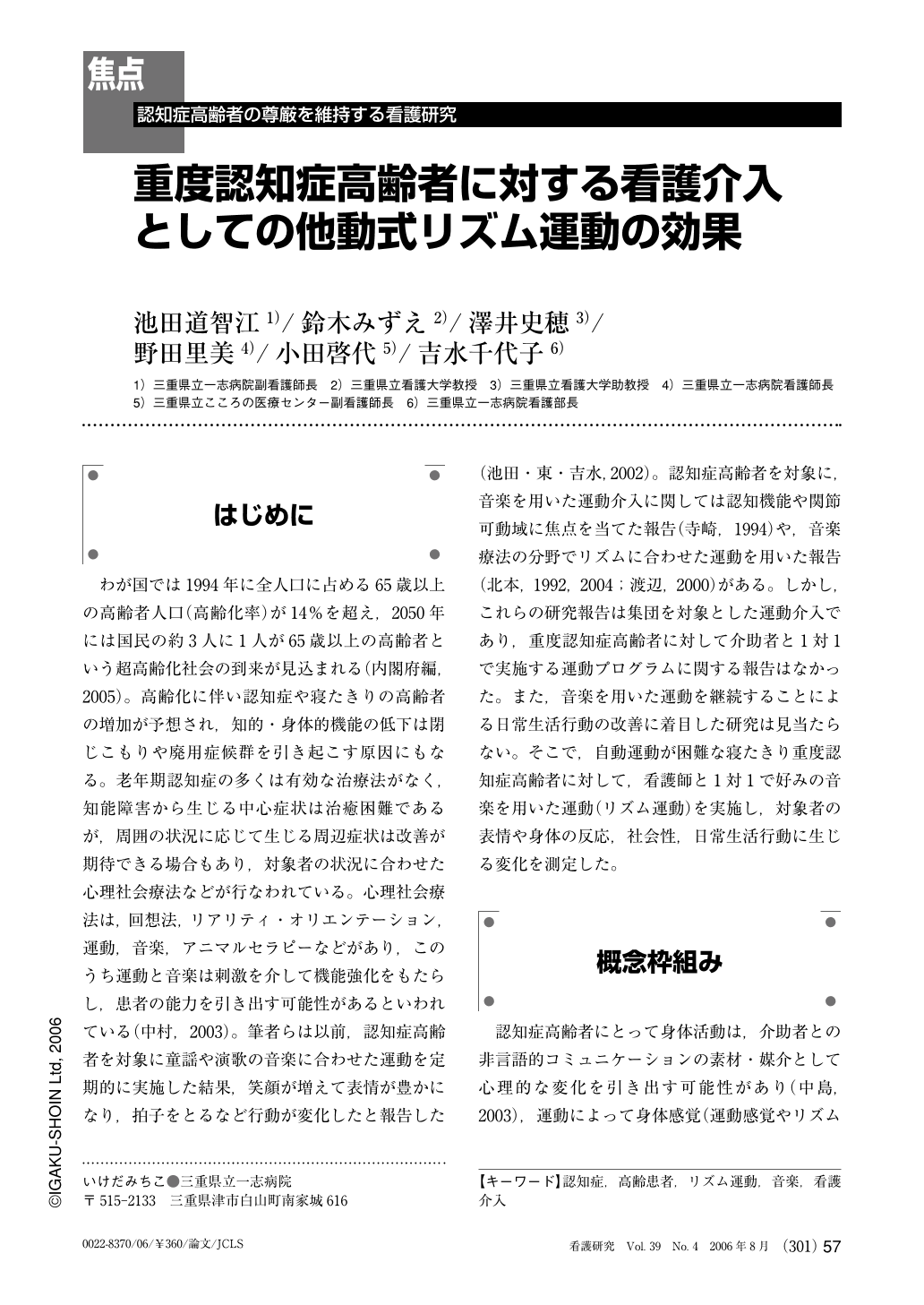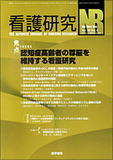Japanese
English
- 有料閲覧
- Abstract 文献概要
- 1ページ目 Look Inside
- 参考文献 Reference
- サイト内被引用 Cited by
はじめに
わが国では1994年に全人口に占める65歳以上の高齢者人口(高齢化率)が14%を超え,2050年には国民の約3人に1人が65歳以上の高齢者という超高齢化社会の到来が見込まれる(内閣府編,2005)。高齢化に伴い認知症や寝たきりの高齢者の増加が予想され,知的・身体的機能の低下は閉じこもりや廃用症候群を引き起こす原因にもなる。老年期認知症の多くは有効な治療法がなく,知能障害から生じる中心症状は治癒困難であるが,周囲の状況に応じて生じる周辺症状は改善が期待できる場合もあり,対象者の状況に合わせた心理社会療法などが行なわれている。心理社会療法は,回想法,リアリティ・オリエンテーション,運動,音楽,アニマルセラピーなどがあり,このうち運動と音楽は刺激を介して機能強化をもたらし,患者の能力を引き出す可能性があるといわれている(中村,2003)。筆者らは以前,認知症高齢者を対象に童謡や演歌の音楽に合わせた運動を定期的に実施した結果,笑顔が増えて表情が豊かになり,拍子をとるなど行動が変化したと報告した(池田・東・吉水,2002)。認知症高齢者を対象に,音楽を用いた運動介入に関しては認知機能や関節可動域に焦点を当てた報告(寺崎,1994)や,音楽療法の分野でリズムに合わせた運動を用いた報告(北本,1992,2004;渡辺,2000)がある。しかし,これらの研究報告は集団を対象とした運動介入であり,重度認知症高齢者に対して介助者と1対1で実施する運動プログラムに関する報告はなかった。また,音楽を用いた運動を継続することによる日常生活行動の改善に着目した研究は見当たらない。そこで,自動運動が困難な寝たきり重度認知症高齢者に対して,看護師と1対1で好みの音楽を用いた運動(リズム運動)を実施し,対象者の表情や身体の反応,社会性,日常生活行動に生じる変化を測定した。
The purpose of this study was to clarify the effects of nursing intervention using music-based rhythmic exercise on the motor function, intellectual function, emotional function, expression, and sociability of elderly patients with severe senile dementia. Subjects were 6 patients (mean age, 87.5±3.7 years) with severe senile dementia who participated in rhythmic exercise (rhythmic exercise group) and 6 patients (mean age, 84.2±9.7 years) with severe senile dementia who did not participate in rhythmic exercise (control group). Rhythmic exercise was performed five times a week for 7 consecutive weeks (35 sessions). The intervention effects were evaluated using the Ehime Music Therapy Scale for Dementia (D-EMS), the Mini Mental State Examination (MMSE), the Gottfries-Brane-Steen Scale (GBS), and the Range of Motion Test (ROM-T).
Following intervention, no significant difference in total MMSE scores was observed between the rhythmic exercise group and the control group. Furthermore, scores on the "orientation", "registration", "recall", and "language" sub-scales of the MMSE showed no significant improvement in the rhythmic exercise group. Total scores on the GBS changed significantly, with the rhythmic exercise group showing improved scores on the “long-windedness” sub-scale (p<0.05). Regarding the D-EMS, scores on the “concentration”, “expression”, “cognition”, “sociability” subscales showed significant improvement in the rhythmic exercise group (p<0.05). A comparison of ROM-T scores collected before and 7 weeks after rhythmic exercise intervention showed significant improvement as a result of intervention. The rhythmic exercise group showed improvement in right elbow extension (p<0.05).
These results suggest that nursing intervention using music-based rhythmic exercise is effective and useful for clinical care.

Copyright © 2006, Igaku-Shoin Ltd. All rights reserved.


